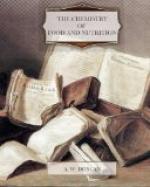bicarbonate—acid calcium phosphate, calcium
superphosphate and calcium sulphate. Common baking
powders often consist of the same ingredients, and
sometimes also of magnesia and alum. These are
often made and sold by ignorant men, whose sole object
is to make money. Calcium superphosphate and acid
calcium phosphate very frequently contain arsenic,
and as the cheap commercial qualities are often used
there is danger in this direction. A good formula
for baking powder is, tartaric acid 8 ozs., sodium
bicarbonate 9 ozs., rice flour 10 to 20 ozs.
The last is added to baking powders to improve the
keeping quality and to add bulk. The ingredients
must be first carefully dried, the sodium bicarbonate
at not too high a temperature or it decomposes, and
then thoroughly mixed; this must be preserved in well
closed and dry bottles. Another formula, which
is slow rising and well adapted for pastry, is sodium
bicarbonate 4 ozs., cream of tartar 9 ozs., rice flour
about 14 ozs. Custard powders consist of starch,
colouring and flavouring. Egg powders are similar
to baking powders but contain yellow colouring.
Little objection can be taken to them if they are coloured
with saffron; turmeric would do if it were not that
it gives a slightly unpleasant taste. Artificial
colouring matters or coal tar derivatives are much
used, several of these are distinctly poisonous.
Drinks.—It is better not to drink during
eating, or insalivation may be interfered with; a
drink is better taken at the end of a meal. The
practice of washing down food with hot tea is bad.
The refreshing nature of a cup of hot tea, coffee,
or cocoa is to a very great extent due to the warmth
of the water. The benefit is felt at once, before
the alkaloid can enter the blood stream and stimulate
the nerve centres. Hot water, not too hot to
cause congestion of the mucous membrane, is one of
the best drinks. When the purity of the water
supply is doubtful, there is advantage in first bringing
it to the boil, as pathogenic bacteria are destroyed.
Some find it beneficial to drink a cup of hot water
the first thing in the morning; this cleanses the
stomach from any accumulation of mucus.
If fruit, succulent vegetables, or cooked food, containing
much water be freely used, and there be little perspiration,
it is possible to do without drinking; but there is
danger of taking insufficient water to hold freely
in solution the waste products excreted by the body.
Aerated drinks, except a very few of the best, and
non-alcoholic beers and wines, are generally unwholesome,
from their containing preservatives, foaming powders,
artificial flavourings, &c.




